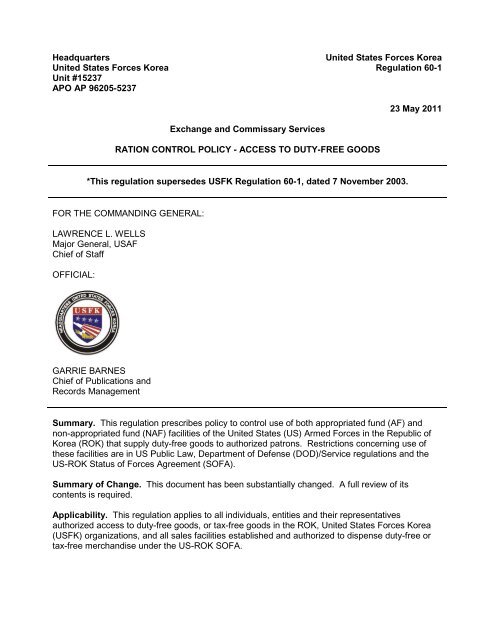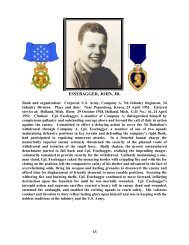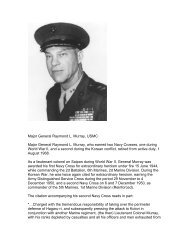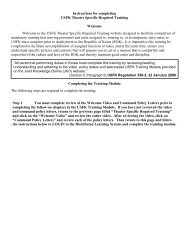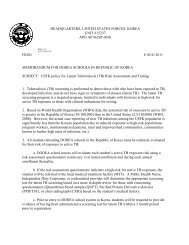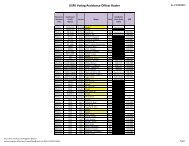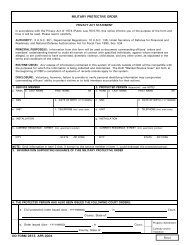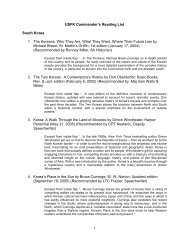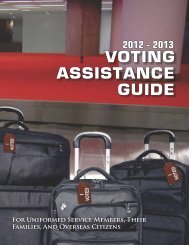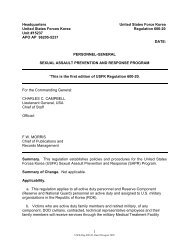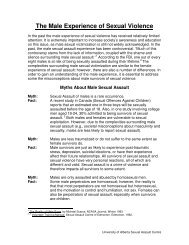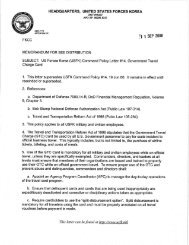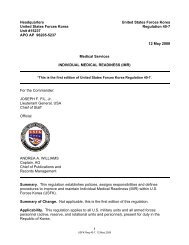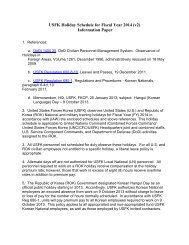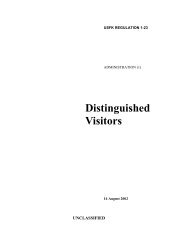United States Forces Korea United States Forces ... - U.S. Army
United States Forces Korea United States Forces ... - U.S. Army
United States Forces Korea United States Forces ... - U.S. Army
You also want an ePaper? Increase the reach of your titles
YUMPU automatically turns print PDFs into web optimized ePapers that Google loves.
Headquarters<strong>United</strong> <strong>States</strong> <strong>Forces</strong> <strong>Korea</strong><strong>United</strong> <strong>States</strong> <strong>Forces</strong> <strong>Korea</strong> Regulation 60-1Unit #15237APO AP 96205-5237Exchange and Commissary ServicesRATION CONTROL POLICY - ACCESS TO DUTY-FREE GOODS23 May 2011*This regulation supersedes USFK Regulation 60-1, dated 7 November 2003.FOR THE COMMANDING GENERAL:LAWRENCE L. WELLSMajor General, USAFChief of StaffOFFICIAL:GARRIE BARNESChief of Publications andRecords ManagementSummary. This regulation prescribes policy to control use of both appropriated fund (AF) andnon-appropriated fund (NAF) facilities of the <strong>United</strong> <strong>States</strong> (US) Armed <strong>Forces</strong> in the Republic of<strong>Korea</strong> (ROK) that supply duty-free goods to authorized patrons. Restrictions concerning use ofthese facilities are in US Public Law, Department of Defense (DOD)/Service regulations and theUS-ROK Status of <strong>Forces</strong> Agreement (SOFA).Summary of Change. This document has been substantially changed. A full review of itscontents is required.Applicability. This regulation applies to all individuals, entities and their representativesauthorized access to duty-free goods, or tax-free goods in the ROK, <strong>United</strong> <strong>States</strong> <strong>Forces</strong> <strong>Korea</strong>(USFK) organizations, and all sales facilities established and authorized to dispense duty-free ortax-free merchandise under the US-ROK SOFA.
CONTENTSChapter 1Introduction, page 11-1. Purpose1-2. References1-3. Explanation of Abbreviations and TermsChapter 2Responsibilities, page 12-1. General Officer Steering Group (GOSG)2-2. Black Market Working Group (BMWG)2-3. USFK Assistant Chief of Staff (ACofS) J12-4. USFK ACofS Acquisition Management2-5. USFK ACofS Provost Marshal (PM)2-6. USFK ACofS Public Affairs Office (PAO)2-7. Executive Agent (EA)2-8. USFK Duty-Free Goods Sales Facility Managers2-9. Component Commanders2-10. Garrison, Base and Wing Commanders2-11. Issuing Agents2-12. Unit Commanders/First Sergeants/Chief Petty Officers or Civilian Equivalents2-13. USFK PersonnelChapter 3Ration Control Policy, page 113-1. General3-2. Liquor Ration Policy3-3. Beer Ration Policy3-4. Commissary Ration Policy3-5. Gasoline Purchase Policy3-6. Shelf and Purchase Limit Policy3-7. Exception to PolicyChapter 4Access Control, page 154-1. Authorized Personnel4-2. Unauthorized Personnel4-3. Access to Duty-Free Goods Facilities4-4. Limited Access4-5. Temporary Ration Control Privileges4-6. Management of Ration Control Cards (RCCs)4-7. Destruction of Permanent and Temporary Ration Control Cards4-8. Replacement of Lost or Stolen Ration Control Cards4-9. Obtaining a Unit Ration Control Card (URCC)
CONTENTS (Cont)Chapter 5Transfer of Duty-Free Goods, page 26Chapter 6Violation Reports, page 26Chapter 7Correction of Records, page 27Chapter 8Revocation of Privileges, page 288-1. Revocation of Privileges8-2. Revocation ProceduresChapter 9Government Purchase Card (GPC) Program, page 29Chapter 10Purchase of Alcohol for Protocol Purposes, page 30Appendixes, page 31A. ReferencesB. Black Market Working Group Members ListC. Sample Request for Temporary Ration Control CardD. Sample Request for Increase for Commissary Dollar or Liquor LimitsE. Sample Request for Gas Ration Control Card (Initial/Renewal)F. Sample Request for Correction of RecordsG. Sample Request for Unit Ration Control CardTable List2-1. Issuing Agencies, page 83-1. Monthly Liquor Ration Limits, page 123-2. Monthly Beer Ration Limits, page 123-3. Monthly Commissary Dollar Limits Based on Family Size, page 134-1. DBIDS Registration Locations, page 164-2. Required Supporting Documentation, page 174-3. Type of Permanent Ration Control Cards, page 204-4. Dual Sponsorship, page 214-5. Ration Control Temporary Privileges Matrix, page 234-6. Temporary Quantity and Commissary Dollar Limits, page 24Glossary, page 40
Chapter 1Introduction1-1. PurposeThis regulation prescribes prohibitions concerning purchase and transfer of duty-free and tax-freegoods, the use of access media, and other activities related to duty-free and tax-free goods.Prohibitions within this regulation are intended to regulate conduct of individual members rather thanto provide general guidelines for the conduct of military functions. This regulation -a. Sets policy to prevent abuse of duty-free privileges afforded authorized patrons under theSOFA.b. Sets policy to ensure duty-free goods are available to authorized patrons.c. Sets procedures regarding access to duty-free goods within the Republic of <strong>Korea</strong> (ROK) tocomply with the <strong>United</strong> <strong>States</strong> (US)-ROK Status of <strong>Forces</strong> Agreement (SOFA).1-2. ReferencesRequired and related publications are listed in appendix A.1-3. Explanation of Abbreviations and TermsAbbreviations and terms used in this regulation are explained in the glossary.Chapter 2Responsibilities2-1. General Officer Steering Group (GOSG)The GOSG is comprised of representatives from <strong>United</strong> <strong>States</strong> <strong>Forces</strong>, <strong>Korea</strong> (USFK) organizationsand activities. See appendix B for GOSG membership listing. The GOSG is chaired by USFK,Chief of Staff (CofS).a. The GOSG is responsible for approving policies to address black marketing issues andmaintain oversight of the command’s efforts to combat potential black marketing problems.b. The GOSG shall meet on an “as needed” basis.2-2. Black Market Working Group (BMWG)The BMWG is comprised of representatives from USFK organizations, Service components andinstallation/garrison activities. See appendix B for BMWG membership listing. The BMWG ischaired by USFK, Assistant Chief of Staff (ACofS) J1.a. The BMWG is responsible for developing policies addressing black marketing and theexcessive purchase of duty-free goods issues, identifying black marketing and the excessivepurchase of duty-free goods trends, and developing recommendations for the command to reviewand take action.b. The BMWG shall meet on a quarterly basis in Yongsan.c. The meeting minutes and an executive summary shall be provided to the command leadersand BMWG members after each meeting for review and to document due-outs to complete.1USFK REG 60-1, 23 May 2011
2-3. USFK Assistant Chief of Staff (ACofS) J1a. Provide policy oversight and management for the Ration Control Program to includeapproval/disapproval of requests for exception to policy after proper coordination with the USFKSOFA Secretariat Office, USFK Judge Advocate (FKJA) and other appropriate offices as required.b. Organize and provide staff to accomplish the following functions:(1) Provide a secretary to the BMWG - USFK J1-41 (Personnel Systems Branch).(2) Notify the appropriate commander and USFK Provost Marshal (FKPM) of personnel whomay have over-purchased and provide evidence of suspected violations of this regulation or blackmarketing activity.(3) Develop and maintain system software and hardware to support an effective and efficientflow of information on purchasing patterns in duty-free retail activities.(4) Monitor and enforce Ration Control Card (RCC) issuance policies and disburse blankRation Control Cards to area issuing agents. After the initial one-year supply of expendable items(e.g., printer ribbon rolls, temporary RCC paper cards, etc), the Issuing Agent (IA) offices will beresponsible to repurchase these expendable items. The J1 will continue to supply the plastic RCC.Cards will be transported either through certified courier, registered mail, or direct transfer to anIssuing Agent.(5) Provide the equipment and personnel required to support the Personnel InformationManagement System <strong>Korea</strong> (PIMSK).(6) Organize and implement a staff assistance and training program for Issuing Agents. Inconjunction with the annual staff assistance visits, USFK J1 (FKJ1-41 Personnel Systems Branch)will conduct IA training workshops as necessary.(7) Monitor staff functions and ration control-related activities for compliance with thisregulation.(8) Serve as the issuing agent for all U.S. general and flag officers assigned to the ROK.(9) Submit to PACOM J1for coordination all USFK shelf limits change requests. Shelf limitrequest must be reported by 1 August annually, therefore any shelf limit reports must be submittedto the USFK J1 (FKJ1-12) by 1 June annually.c. Assist Garrison or Wing Commanders in establishing new IA office or closure of existing IAoffice by adjusting computer records to match the commander’s request and notifying thecommander when this action is completed. USFK J1 (FKJ1-41) is also responsible for conductingtraining of newly appointed IAs.d. Provide an annual report to Congress and the Office of the Secretary of Defense through<strong>United</strong> <strong>States</strong> Pacific Command (USPACOM) on ration control policy in the ROK.2USFK REG 60-1, 23 May 2011
2-4. USFK ACofS Acquisition Management (FKAQ)a. Verify the eligibility of Invited Contractor (IC)/Technical Representative (TR) personnel andtheir family members for access to duty-free goods and initial issue of a RCC, via USFK Form 700-19A-E (Invited Contractor and Technical Representative Personnel Data Report) in accordance with(IAW) USFK Regulation 700-19 (The Invited Contractor and Technical Representative Program).b. Take appropriate action against ration violations by IC/TR personnel.2-5. USFK ACofS Provost Marshal (FKPM)a. Advise on excessive purchasing of duty-free goods and black marketing trends and patterns.b. Act as the focal point for USFK law enforcement coordination to suppress the excessivepurchasing of duty-free goods and black marketing. Take appropriate action against rationviolations. Assist in providing information to commanders and appropriate USFK law enforcementelements regarding potential excessive purchasing of duty-free goods or black marketing in order forappropriate action to be taken against violators. In such capacity, the Provost Marshal (PM) mayrequest additional assistance from USFK J1 (FKJ1-41) for more detailed reports and/or data queriespertaining to a case in question.c. Serve as a member of the BMWG to develop policies to deter black marketing and to provideoversight of the merchandising and monitoring of products popular on the black market.2-6. USFK ACofS Public Affairs Office (PAO)a. Publicize through news releases, The Morning Calm newspaper, American <strong>Forces</strong> Network-<strong>Korea</strong>, USFK Website, Internet and other means, this regulation, its enforcement, and disciplinaryactions taken against violators (violators will not be personally identified).b. Respond to requests for information on SOFA provisions from civilian news media.2-7. Executive Agent (EA)Provide manning support for ration control operations. The following positions are filled by EA, <strong>Army</strong>Support Element <strong>Korea</strong> (ASE-K):a. A Noncommissioned Officer in Charge, Customer Service Branch, 42A30.b. A <strong>Korea</strong>n Augmentee to the <strong>United</strong> <strong>States</strong> <strong>Army</strong> (KATUSA).2-8. USFK Duty-Free Goods Sales Facility Managersa. Ensure all sales are conducted within the spirit and intent of this regulation and the SOFA.Applicable facilities include those selling duty-free or tax-free goods, including exchanges,commissaries, and Morale, Welfare and Recreational (MWR) facilities.b. Set quantity buying restrictions (purchase limits) in coordination with the Garrison or WingCommander, as necessary, on individual purchases of selected items to ensure availability to allauthorized patrons.c. Conspicuously post notices of purchase limits in sales facilities.3USFK REG 60-1, 23 May 2011
d. Train employees, at least semiannually, on the requirements of this regulation and anyauthorized supplements.e. Develop and implement procedures to ensure only individuals authorized access to duty-freegoods are allowed to purchase them.f. After coordination with the servicing civilian personnel office, consider appropriate disciplinarymeasures against employees who violate this regulation IAW civilian personnel regulations andapplicable union agreements.g. Establish procedures to ensure sales of controlled items are recorded accurately andtransmitted to USFK J1 (FKJ1-41) on a daily-basis.h. Establish procedures to check Identification (ID) cards and/or RCC of patrons entering aduty-free goods sales facility. Facilities selling food or beverages for on-premise consumption arenot required to check ID cards. If over-the-counter take-out food or beverages are sold for offpremiseconsumption, ID cards must be checked. For small facilities (less than three cashregisters) access media will be checked at the cash register; however, if this procedure is used, theaccess media must be checked before the cashier rings-up the sale. When checking access media,sales facility employees must do the following:(1) Check the expiration date on the access media. If the access media has expired, theemployee must deny access. Employees should advise the individual presenting the expiredaccess media that the access media requires renewal or replacement before access will be granted.(2) Check the limits/restrictions specified on the RCC.(3) Ensure the names on all documents match.i Follow prescribed procedures prior to opening a duty-free sales facility:(1) Opening a new sales facility requires the store manager to notify the USFK J1 (FKJ1-41)of the opening by submitting a memorandum through the supporting IA which includes the followinginformation:(a) The desired opening date.(b) The Garrison or Base name.(c) The store’s name and number.(d) The store manager’s and assistant’s names, telephone numbers and emailaddresses.(2) Supporting IA must verify the information and forward the memorandum to USFK J1(FKJ1-41).(3) USFK J1 (FKJ1-41) will update the PIMSK database.j. Follow prescribed procedures prior to closing a duty-free sales facility.4USFK REG 60-1, 23 May 2011
(1) Closing a duty-free sales facility requires the store manager to notify USFK J1 (FKJ1-41)of the closure by submitting a memorandum through the supporting IA which includes the followinginformation:(a) The desired closing date.(b) The Garrison or Base name.(c) The store’s name and number.(d) The store manager’s and assistant’s names, telephone numbers and emailaddresses.(2) The store manager and supporting IA must verify the information in the memorandumand check the control log to ensure accountability of ration control equipment provided by USFK J1(FKJ1-41). Upon finalizing accountability, the store manager shall inform the supporting IA and turninthe memorandum and equipment to USFK J1 (FKJ1-41).(3) USFK J1 (FKJ1-41) will update the PIMSK database.2-9. Component Commandersa. Ensure all members of their respective organizations are aware of the contents of thisregulation.b. Ensure appropriate action is taken against personnel who engage in activities which violatethis regulation.c. Establish policy and directive to govern ration control program to include in/out-processing ofpersonnel.d. Ensure Mission Unit Commanders (Battalion and below) use the Ration Control Monitor Toolto track and document ration violations.2-10. Garrison, Base and Wing Commandersa. Coordinate requirements of this regulation with retail outlets and enforce compliance.b. Coordinate with retail managers to impose temporary or permanent shelf limits.c. Establish Issuing Agency (IA) office. Prior to opening a new IA office, coordinate with USFKJ1 (FKJ1-41) for support. To the greatest extent possible, limit one IA office per garrison or wing.When considering whether or not to create a new IA office, garrison or wing commanders shouldconsider key factors such as geography, customer convenience, and the need for maintaining strictcontrol over IA’s operations.(1) Appointment of IA in writing is a non-waiverable requirement and must be documented inan appointment letter or order signed by the garrison or wing commander or designatedrepresentative. Copies of the appointment letter or order, DD Form 577 (Signature Card) must beelectronically forwarded to USFK J1 (FKJ1-41) before the IA can receive any support from USFK J1(FKJ1-41).5USFK REG 60-1, 23 May 2011
(2) The following IA’s qualifications should be met by the selected individual:(a) Consider Department of Defense (DOD) civilians over military personnel for primaryand alternate IAs. Selected military personnel should be in grade of E-4 or above.(b) US Citizenship, if not, submit waiver request memo to USFK J1 (FKJ1-41) forapproval. However, Foreign Nationals employee will not have access to the PIMSK unless afavorable Defense National Agency Check with Inquiries or National Agency Check with Inquirieshas been obtained for such individuals.(c) Primary and alternate IAs should have more than six months retainablity in <strong>Korea</strong>and no record of ration control violations.(d) To the greatest extent possible, the primary and alternate IA DEROS dates shouldbe staggered to provide continuity.(3) Prior to the desired IA office operational date, notify USFK J1 (FKJ1-41) in writing, nolater than (NLT) 30 days in advance. Submit request to the USFK J1 (FKJ1-41), Unit #15237, APOAP 96205-5237 and include the following information:(a) The Garrison or Base name.(b) Email and mailing addresses for the new IA office. Include Unit Number and APO inthe mailing address.(c) Primary and alternate IA names, ranks and telephone numbers.(d) Listing of all units to be serviced by the new IA office. Listing must include completeunit title, unit identification code (UIC) or personnel accounting symbol (PAS) code, unit’sgeographical location (including the APO), and unit’s previous IA’s name (if applicable). Foradditional information visit the J1 Ration Control Program Overview.d. Closing an IA Office. Prior to closing an IA office, ensure continued ration control programservice to supported units is established. Additionally, the area commander must notify USFKJ1(FKJ1-41), in writing, of the proposed closure a minimum of 60 days in advance of proposedclosing date. The notification letter must include the following:(1) The Garrison or Base name.(2) Mailing address of IA, including the APO.(3) Desired closing date.(4) Listing of all units to be serviced by the IA office. Listing must include complete unit title,UIC or PAS code and unit’s geographical location (including the APO). For additional informationvisit the J1 Ration Control Program Overview.(5) Ensure out-going IA will coordinate with the new IA to accomplish the following actions:(a) Complete a signature transfer to the new IA of all records including undeliveredRCCs, excess purchase rosters, other mail and/or documents.6USFK REG 60-1, 23 May 2011
(b) Turn-in of all RCCs to USFK J1 (FKJ1-41) within 24 hours of closing.(c) Notify each unit in writing of the effective date of transfer and provide the name andcontact information of the new IA.e. Unit activation/deactivation. In coordination with the supporting IA office, notify USFK J1(FKJ1-41) in writing, of the proposed unit activation/deactivation. The letter must arrive no later than30 days prior to the proposed effective date of the unit’s activation/deactivation and include thefollowing information:(1) Name of the unit.(2) The UIC or PAS code.(3) IA’s name and contact information.(4) Complete unit address, including the APO.(5) Desired activation/deactivation date.(6) USFK J1 (FKJ1-41) will notify the commander, through the supporting IA, when thecomputer records have been updated.f. Request for Ration Control Check (USFK Form 217). Submit the request to the supporting IAoffice for processing. This ration control check report only details violations to ration control policyby an individual and their dependents and can only be requested by a unit commander within theirunit or by FKAQ for invited contractors.g. Revoke access privileges for individuals involved in black marketing, illegal transfer of dutyfreegoods, or purchasing in excess of personal needs. To prevent the individual from receivinganother RCC, provide a copy of the revocation notice to the servicing IA, USFK J1 (FKJ1-41), andFKPM-SSD.h. Investigate, in coordination with local law enforcement, reports of lost, stolen and confiscatedRCCs prior to authorizing issuance of a replacement RCC.2-11. Issuing AgentsIssuing agents are assigned to each USFK Garrison or Wing and administer the ration controlprogram on behalf of the garrison or wing commander and USFK J1 (FKJ1-41). Table 2-1 providesa listing of the issuing agencies’ locations.7USFK REG 60-1, 23 May 2011
Table 2-1Issuing AgentsCNFK, Chinhae Bldg 606 Chinhae Navy Base 762-5558Camp Carroll Bldg S-946 Waegan 765-7890USAG Casey Bldg 2440 Dongducheon 730-3475U.S. Embassy 32 Sejongro, Jogno-gu Seoul 721-4161USAG Humphreys Bldg 544, Room 3 Pyeongtaek 753-30127 AF/51MSG Bldg 765 Osan Air Base 784-18537 AF/8MSG Bldg 590 Kunsan Air Base 782-5249USAG Red Cloud Bldg 611 Uijeongbu 732-7660Camp Henry Bldg T1712 Daegu 768-7518USAG Yongsan Bldg S-4304 (1RC) Yongsan/Seoul 738-4612J1-DM Bldg 2402A, Main Post Yongsan/Seoul 723-6123a. Provide the customer support of all ration control related issues within respective area.b. Process RCC requests and issue RCCs to authorized personnel and their family members.c. Verify RCC requests and required supporting document with the PIMSK web application.Ensure individual requestor’s record in the ration control web application is current, accurate, andcomplete for the individual and/or family members. Issue USFK Forms 73 (1, 2, 3, 4, 5) toauthorized personnel via PIMSK.d. Direct customers to the nearest Defense Biometric Identification System (DBIDS) registrationpoint to correct any personnel information discrepancies prior to issuing RCC. See table 4-2 forDBIDS locations.e. Retrieve ration control violations list from the PIMSK web application and distribute toviolators, and their unit commanders. Annotate actions taken against ration control violators in thePIMSK database by suspense date as noted on “show cause” letters.f. Destroy expired, duplicated, incorrect, or otherwise unneeded permanent and temporaryRCCs. Input destruction via the PIMSK web application.g. Control access to RCC accountability forms. Store forms in a US General ServiceAdministration (GSA)-approved security container.h. Provide guidance to garrison, wing and unit commanders and first sergeants/chief pettyofficers or civilian equivalents, on the procedures for enrolling assigned personnel into the rationmonitoring tool.i. Issue USFK Form 46-3 (Temporary Ration Control Card) to authorized personnel via PIMSK.8USFK REG 60-1, 23 May 2011
j. Confiscate ration card(s) during personnel out-processing and record it in the PIMSK webapplication.k. Process requests USFK Form 217-E (Request for Ration Control Check) from unitcommanders and first sergeants/chief petty officers or civilian equivalents, and complete rationcontrol checks for monthly sales summaries via PIMSK. Only the sponsor may request or pick-up afull report of his/her sales record from USFK J1 (FKJ1-41).l. Review Unit Ration Control Card (URCC) purchases and provide respective commanders withinformation on personnel not compliant with this regulation.m. As applicable, the new IA, in coordination with the previous IA, is responsible for picking-upration control records and logs, excess purchase rosters, and/or other mail or documents from theprevious IA and ensuring each unit and sales facility is notified, in writing, of the effective date ofsupport transfer and name and contact information of new IA.n. For new and existing IA personnel needing training, coordinate training with USFK J1 (FKJ1-41). Training conducted by USFK J1 (FKJ1-41) shall be completed before access to PIMSK can begranted. Attendance shall be required at USFK J1 IA workshops unless specifically exempted byUSFK J1 (FKJ1-41).2-12. Unit Commanders/First Sergeants/Chief Petty Officers or Civilian Equivalentsa. Oversee the unit’s Ration Control Program.b. The unit commander or designated representative is responsible for briefing new unitmembers on the contents and provisions of this regulation. This requirement is in addition to anyinformation that may have been provided at in-processing centers or other forums. Briefings mustinclude the following:(1) An explanation of liquor and beer ration policies, commissary monthly dollar limit and anylocal policies.(2) An explanation of how to properly dispose of duty-free goods IAW with this regulationand USFK Regulation 643-2 (Transfer of Duty-free Items).(3) An explanation of the garrison or wing commander’s policies on ration control violations,black marketing, illegal transfer of duty-free goods, and excessive purchasing of duty-free goods.(4) An explanation of dual sponsorship, as applicable, and as related to the ration controlprogram.(5) Newly assigned unit personnel failing to receive this briefing or receipt of a flawed orincomplete briefing, does not constitute a defense to a charge of violating any of the provisions ofthis regulation.c. Transfer of all personnel from one unit to another, requires the gaining unit commander tosubmit a transfer letter through the supporting IA to USFK J1 (FKJ1-41), 30 days prior to the desiredtransfer date and include the following information:(1) The UIC or PAS code of the losing unit.9USFK REG 60-1, 23 May 2011
(2) The UIC or PAS code of the gaining unit. If the gaining unit is a new unit, include theunit’s name, complete address (including APO), and the gaining unit’s IA name.(3) Desired effective date.(4) If the desired transfer date will be reflected in the following month, or upon update of thecomponent’s personnel system.d. In coordination with garrison or wing commanders or designated representatives, takeappropriate action against personnel who over-purchased or otherwise violated the provisions of thisregulation.e. Request ration control check using USFK Form 217-E (Request for Ration Control Check) foran individual within their units. Submit the request to the supporting IA office for processing. Onlythe sponsor may request and pick-up a full report of his/her sales record from the supporting IA.f. Recommend approval or disapproval for exceptions to policy for ration limits to USFK J1(FKJ1-12) for final decision.g. Coordinate and schedule duty-free goods inventories in cases of suspected unauthorizedtransfer of duty-free goods. Notify applicable Military Criminal Investigating Organization (CriminalInvestigating Division - CID, Air Force Office of Special Investigations - AFOSI or Naval CriminalInvestigating Service - NCIS) of suspected duty-free goods violations. Coordinate and consult withthe servicing SJA to ensure there is a proper legal basis for inspections of duty-free merchandisepurchased by individuals.h. Ensure personnel, except unaccompanied military, out-process through the appropriate IAoffice and turn-in RCC.i. Ensure all personnel out-process through the DBIDS station to de-register, including theirfamily members.j. Enroll all personnel into the USFK Ration Monitor Tool via PIMSK. Appoint a unit Point ofContact (POC) and submit a Ration Monitor System Application through the appropriate IA office.Receive along with the unit POCs a monthly email notification of any ration limit violations. Use theRation Monitor Tool to review unit ration violations as well as document the actions taken againstration limit violations within 60 days of notice.2-13. USFK Personnela. Comply with this regulation and maintain RCC security (temporary or permanent RCC) toprevent loss, theft, or unauthorized use or alteration.b. Understand that sponsors are required to register all family members, regardless of age, inDBIDS to ensure family ration limits are set properly.c. Understand that RCC is not transferable between family members or any other authorizedpatrons.d. Restrict purchases to those required for personal needs, the needs of authorized familymembers, and bona fide gifts IAW USFK Regulation 643-2 (Transfer of Duty-Free Items).e. Ensure sales clerks properly record purchases, void transactions and returns for refunds.10USFK REG 60-1, 23 May 2011
f. Report known or suspected violations of this regulation to the unit commander or lawenforcement personnel.g. Immediately turn-in found RCC to supporting IA or law enforcement.h. Dispose of items that are no longer serviceable or needed using the procedures outlined inUSFK Regulation 643-2 (Transfer of Duty-Free Items).i. Report lost or stolen RCC to law enforcement to obtain MP report (DA Form 3975) prior toapplying for a replacement.j. Understand that the sponsor is the only person who can request RCC(s) from the IA.However the sponsor may authorized (in writing) his/her dependent(s) to pick up the RCC(s).k. Understand that the sponsor may submit a USFK Form 217-E (Request for Ration ControlCheck) to the supporting IA office for processing. Only the sponsor may request a full report ofhis/her sales record from the supporting IA office. Only the sponsor may pick-up a full report ofhis/her sales record from the supporting IA office.Chapter 3Ration Control Policy3-1. Generala. Military Service members violating this regulation are subject to punishment under theUniform Code of Military Justice (UCMJ), Section VII, Article 92, for failure to obey a lawful generalorder or regulation.b. Civilian personnel (military family members and DOD IC/TR family members) violating thisregulation are subject to adverse administrative action or criminal prosecution as authorized byapplicable ROK law, U.S. Code sections or federal and local regulations.c. Black marketing of USFK duty-free goods in the ROK has been problematic for USFK,resulting in the placement of limits on selected duty-free goods most subject to abuse. The followingduty-free goods are affected:(1) Liquor - the amount of liquor that can be purchased monthly is limited.(2) Beer - the amount of beer that can be purchased monthly is limited.(3) Food - the monthly amount of money that may be spent in the commissary is limited.3-2. Liquor Ration Policya. Liquor is defined to be any beverage that is 20% or more alcohol by volume. Liquor sales arerestricted to those personnel age 21 or older with ration control privileges and are rationed in termsof alcohol units. All purchases of liquor regardless of size will be counted against the monthly rationlimit.11USFK REG 60-1, 23 May 2011
. To receive family limits, a family must consist of at least two adults age 21 or older regardlessof command sponsorship status. These monthly limits are determined based on data shown in table3-1.Table 3-1Monthly Liquor Ration LimitsItem Individual FamilyLiquor 3 units 5 unitsAlcohol 20 percent or more by volume is rationed in liquor units.One unit of liquor = fifth, quart or literCurrent Liquor Sales Inventory1 gallon = 4 units1.75 liter = 2 units700-750 ml = 1 unit1 pint/375 ml = 1/2 unit1 miniature = 1/12 of a unitNOTE: The liquor limits are monthly and not cumulative from month to month. To receive the"family" size ration, there must be two adults (age 21 or older) in the family.Wine is not counted against the liquor limits.3-3. Beer Ration Policya. Eligible patrons at least 21 years of age may purchase no more than eight (8) cases of beerper month per family.b. The beer monthly limits are determined based on data shown in table 3-2.Table 3-2Monthly Beer Ration LimitsCurrent Beer Sales Inventory24pk of 12 oz bottle or can = 1 case12pk of 12oz bottle or can = 0.5 case6pk of 12 oz bottle or can = 0.25 case½ barrel or ½ keg = 3.5 caseNOTE: The beer limits are monthly and not cumulative from month to month.12USFK REG 60-1, 23 May 2011
3-4. Commissary Ration Policya. Commissary ration policy employs monthly dollar limits based on family size to deter abuse ofduty-free privileges.b. The commissary monthly limits are shown in table 3-3.Table 3-3Monthly Commissary Dollar Limits Based on Family SizeOne Person $650Two Persons $950Three Persons $1,200Four Persons $1,500Five Persons $1,7006 Persons or More $2,000NOTE:1. The dollar limits will apply to all items purchased from the commissaries. The 5% surcharge isnot considered part of the purchase.2. The dollar limits are monthly and not cumulative from month to month.3. For individuals with temporary privileges, the dollar limit on the temporary RCC is valid for theperiod specified and is not cumulative; unused amounts become void at the time of expiration.4. Local-hire civilian employees whose spouse has a separate, independent basis for his or herpresence in the ROK will have the One Person limit.5. Newly arrived permanent party personnel and their families may exceed their monthly limit by50% for the first three months. The 50% does not apply to the liquor and beer limits. Regardless ofarrival date, the first month is considered from arrival date to end of that month.Current USFK CoS approved limits are available at our website: https://pimsk.korea.army.mil.3-5. Gasoline Purchase Policya. Authorization to purchase gasoline will not be included in contracts, memoranda ofagreement, or memoranda of understanding without the USFK J1(FKJ1-12) and FKAQ approval.b. Authorized patrons may purchase gasoline for vehicles registered on a USFK militarypost/base, displaying a post/base decal and by presenting the DOD or USFK ID, and RCC.c. Authorized Patrons Fueling Non-SOFA Plated Vehicles -(1) Patrons must display ID, RCC and vehicle registration decal. The names on alldocuments must match. Non-SOFA plated vehicles, with the exception of rental or leased vehicles,must display a post/base registration decal.13USFK REG 60-1, 23 May 2011
(2) Patrons with rented or leased vehicles must present a copy of the rental or leaseagreement in lieu of the vehicle’s registration document along with ID and RCC. The names onthese documents must also match.d. Purchase of "carryout” fuel is limited to no more than five gallons per day.e. Gas RCC only applies to <strong>Korea</strong>n national (KN) in law enforcement, military intelligencepersonnel working as part of a joint (US-ROK) investigative team, where use of a US governmentownedvehicle would hamper undercover operations, may be authorized access to gas RCC. If theduties of the KN employees are not those described above, the KN employee is not authorized topurchase duty-free fuel.(1) Application for gas RCCs will be made by memorandum along with a copy of SF-50(Notification of Personnel Action) through the garrison or wing commander and the servicing IA toUSFK J1 (FKJ1-12). The request must be made by the unit commander or civilian equivalent. Seeappendix E for sample.(2) Renewal of gas RCC shall be in memorandum format (see appendix E) with a copy ofthe individuals USFK ID card and current gas RCC attached and submitted through the servicing IAto USFK J1 (FKJ1-12). The USFK J1 (FKJ1-12) will process the request and upon approvalproduce the new gas RCC and provide it to the requesting organization’s supporting IA.f. Garrison and wing commanders may establish heating fuel (Kerosene) limits. Heating fuellimits must be in writing and a copy of the limits provided to USFK J1 (FKJ1-41). Limits must beprominently posted at locations which allow easy viewing by authorized patrons. Heating fuel mayonly be purchased by authorized patrons upon presentation of the appropriate access media. Useof gas ration cards to purchase heating fuel (kerosene) is not authorized.3-6. Shelf and Purchase Limit Policya. Shelf limits are imposed as a tool to prevent and deter over purchasing of items popular onthe black market. All shelf limits recommendations must be submitted to the USFK J1 (FKJ1-12) by1 June annually for coordination through PACOM J1 (submit requests toJ11WorkFlow@korea.army.mil). After complying with 10 USC §2489, DODIs 1330.17 and 1330.21,garrison and wing commanders, in coordination with sales facilities managers, may place shelf limitson the selected items. New shelf limit requests must be reported to congress by 1 August annuallybefore implementing any changes. Each report must describe changes to the host-nation laws andthe treaty obligations of the <strong>United</strong> <strong>States</strong> and the conditions within the host nation that require theuse of new quantity or other restrictions on purchases in commissaries and exchange stores.Negative reports are required (DODI 1330.21, Para 6.6). Commanders may not add a merchandiseitem unless USD (P&R) approves and notifies Congress of the proposed addition and the reasonsfor the addition of the item. Sales facilities managers are required to prominently post signsannouncing shelf limits in English and in <strong>Korea</strong>n. A request to purchase in excess of the shelf limitrequires prior approval from the garrison or wing commander (or their designated representative).b. Purchase limits are not identical to shelf limits. Purchase limits are a sales facility manager’stool to guarantee product availability. Sales facilities managers may impose purchase limits IAWapplicable <strong>Army</strong> and Air Force Exchange Service (AAFES) or Defense Commissary Agency (DeCA)guidelines to assure the availability of merchandise to all authorized customers. Quantity or otherrestrictions may not discriminate among the various categories of patrons, and shall be consistentwith the purpose of the commissaries to provide reasonable access for authorized patrons topurchase merchandise items (DODI 1330.17, para 4e).14USFK REG 60-1, 23 May 2011
3-7. Exception to Policya. Requests for an exception to policy to increase ration limits shall be submitted through unitcommanders/first sergeants/chief petty officers or civilian equivalents to the supporting IA office.The supporting IA will forward the requests to USFK J1 (FKJ1-12) for approval/disapproval. Afterthe-factrequests for increases will not be approved.b. A ration limit increase is defined as an increase of ration limits per month over the requestor'scurrent limits.c. If approved, USFK J1(FKJ1-41) will enter the approved ration limit increase into the PMISKdatabase. USFK J1 (FKJ1-12) will provide an email confirmation to the individual and supporting IAregarding the approved ration limit increase. See appendix D for sample request for an increase toliquor or commissary dollar limits.d. Distinguished U.S. citizen visitors are granted temporary access to duty-free goods throughthe USFK Protocol office via USFK Form 46-3 (Temporary Ration Control Card). These accessmedia are valid for a maximum of 60 days and may be issued to general or flag officers, equivalentgradeenlisted/civilians, spouses or staff, as determined by the Chief, Protocol Branch, SecretaryCombined Joint Staff.e. Exceptions to policies established in accordance with the provisions of the ROK-US SOFA(such as who may have access to duty free goods) may not be granted by USFK without theagreement of the ROK government. Requests for exceptions to policy established by this regulationshall be submitted through unit commanders/first sergeants/chief petty officers or civilian equivalentsto the supporting IA office. The supporting IA will forward the requests to USFK J1 (FKJ1-12) forstaff review and ultimately approval/disapproval.Chapter 4Access Control4-1. Authorized Personnela. Access to duty-free goods is controlled by the US-ROK SOFA and U.S. laws, regulations andpolicies. All sponsors and family members must register in the Defense Biometric IdentificationSystem (DBIDS). Noncompliance shall result in the denial of duty-free privileges. DBIDSregistration locations are identified in table 4-1.15USFK REG 60-1, 23 May 2011
Table 4-1DBIDS Registration LocationsInstallation Location Bldg # Phone # Area REMARKSCamp Mobile In Processing Center S2711 730-3491 IMilitary InprocessingonlyUSAG Red Cloud Pass & ID Office 225 732-9266/7234 IUSAG Casey Pass & ID Office S2440 730-6896 IUSAG Yongsan Visitor Center S4034 723-6456 IIUSAG Yongsan Pass & ID Office Camp Kim 724-4300 IIUSAG Humphreys Pass & ID Office 544 753-6609 IIICamp Carroll Pass & ID Office 946 765-8537 IVCamp Henry Pass & ID Office 1712 768-6917 IVOsan Air BasePass & RegistrationOffice765 784-4489/1557 VKunsan Air Base Pass & ID Office 590 782-4900 VIChinhae Navy Base Pass & ID Office 612 762-5296 VIIb. All family members, including dependents under the age of ten, must be registered in DBIDSto be counted towards a family size for the monthly commissary dollar spending limit. Onceindividuals register in DBIDS, they will automatically be registered in ration control, but still must visitan issuing agent office to request ration control cards. See table 4-2 for additional requiredsupporting documentation to receive ration control cards.16USFK REG 60-1, 23 May 2011
Table 4-2Required Supporting DocumentationFamily members of active duty• Sponsor's PCS orders to <strong>Korea</strong>• Sponsor’s DOD ID• Dependent's DOD IDDoD Civilians and Family Members• Letter of Employment or TDY orders• Sponsor’s DOD ID• Dependent's DOD IDContractors and Family Members• USFK Form 700-19A (Invited Contractor and Technical Representative Personnel DataReport) (even if TDY) with validated stamp within 30 days of arrival• Sponsor’s ID• Passport• Dependent's IDRetiree/Widow/Widower• Passport with visa expiration date no earlier than 90 days• Retiree IDNOTE:• Personnel must be properly registered in DBIDS before coming to ration control office forration control cards.• All personnel have to update their DEROS at their Personnel Office before coming to theration control office.• There is a delay up to an hour after updating DBIDS before ration control office can processyour requests for a ration control card.• Temporary ration control cards will not be issued if a permanent ration control card expires.Personnel can request a new ration control card ten days in advance to avoid any loss ofprivileges while waiting for a new permanent ration control card.• A new ration control card will not be issued if the existing card's expiration date is more than30 days away.• Refer to USFK Regulation 700-19, <strong>United</strong> <strong>States</strong> <strong>Forces</strong> <strong>Korea</strong> Invited Contractors andTechnical Representatives, for information regarding installation access control.c. Personnel with expiring ration control card should visit a DBIDS registration site withpaperwork documenting the extension of DEROS or stay in <strong>Korea</strong>, then visit an issuing agent torequest new ration control card 30 days prior to expiration date. See USFK Regulation 190-7,appendix F for DBIDS expiration time periods.d. The following categories of personnel are authorized and entitled to access duty-free goods:(1) Active duty military of-(a) The US when present in the territory of the ROK.17USFK REG 60-1, 23 May 2011
(b) Third-country armed forces assigned (permanently or temporarily) to the <strong>United</strong>Nations Command Military Armistice Commission (UNCMAC), Neutral Nations SupervisoryCommission (NNSC), <strong>United</strong> Nations Command (UNC), or UNC Liaison Group.(2) US citizen employees of DOD and non appropriate fund (NAF) agencies who are notordinarily resident in <strong>Korea</strong> and are working 20 or more hours per week or 40 or more hours withintwo weeks. See the glossary for the definition of “ordinarily resident".(3) US citizen employees of non-DOD US Government departments and agencies in anofficial capacity while in the ROK if authorized by applicable DOD and service regulations governingcommissary and exchange service operations and when consistent with SOFA requirements Accessto commissary facilities is governed by DODI 1330.17. Access to exchange facilities is governed byDODI 1330.21.(4) Full-time, US citizen employees working in agencies supporting USFK. This categoryincludes the American Red Cross (ARC); the Girl Scouts of the <strong>United</strong> <strong>States</strong> of America (GSUSA);the Boy Scouts of America (BSA); executive and professional staff of the <strong>United</strong> ServiceOrganization (USO) who are on invitational orders and assigned duties (permanent and/ortemporary) overseas; executive directors and associated directors of the <strong>United</strong> <strong>States</strong> Seamen’sOrganization (USSO); and Military Sealift Command (MSC) civil service marine personnel deployedto the ROK on MSC-owned and operated vessels. Access to personnel in this category will besubject to the requirements of applicable DOD and service regulations which govern authorizedsupport to these entities.(5) ICs who are ordinarily resident in the US and US citizen TRs not ordinarily resident in theROK, when authorized under the terms of their contract and properly designated IAW USFKRegulation 700-19 (<strong>United</strong> <strong>States</strong> <strong>Forces</strong> <strong>Korea</strong> Invited Contractors and Technical Representatives)in paragraph 3-6.(6) Active members of the US reserve component assigned to a military organization in theROK if authorized by applicable DOD and service regulations governing commissary and exchangeservice operations.(7) Retired US military drawing full retirement pay and benefits, 100-percent disabledveterans and Medal of Honor recipients while in the ROK.(8) Un-remarried widow/widower drawing full military benefits of a deceased US militaryspouse.hires.(9) Accompanying family members of categories listed above, except those of civilian local(10) Full-time US citizen employees of DOD and NAF agencies who are on GovernmentIssued order of temporary duty/temporary additional duty (TDY/TAD) in the ROK.(11) ICs/TRs, who meet the requirements in paragraph 2-4, who are on Government Issuedorder of TDY/TAD in the ROK.(12) Pending divorce, a spouse may retain privileges until the divorce is finalized providedthe spouse’s sponsor remains in <strong>Korea</strong>.18USFK REG 60-1, 23 May 2011
(13) Other persons and organizations with the express consent of the ROK Government incoordination with US-ROK SOFA Article XIII, Agreed Minute. Submit requests for access to dutyfree goods IAW this subparagraph to the supporting IA which will forward the requests to USFKJ1(FKJ1-12) for staff review and ultimately approval/disapproval.4-2. Unauthorized PersonnelIndividuals who do not fall into one of the categories outlined above are not authorized access toduty-free goods. This includes, but is not limited to, the following groups:a. Family members of civilian employees working less than 40 hours per week or 80 hours over2 weeks.b. Civilian employees in positions paid for with appropriated funds (APF) that are intermittent,regardless of the number of hours worked. Civilian employees in positions funded by nonappropriatedfunds (NAF) that are flexible and only employed on an as-needed basis, do not haveaccess, regardless of the number of hours worked.c. Retired reserve component members who are not yet receiving full retirement pay andbenefits (pink ID card holders).d. Reserve component members not assigned to a military unit in the ROK nor on orders toUSFK for exercise purposes.e. Family members of widow/widower are not authorized ration privileges.f. Family members visiting in the ROK without their sponsor including but not limited todependents of service members deployed to a combat zone and dependents of environmentalmorale leave (EML).g. Family members of civilian local hires, when such family members have a separate basis fortheir presence in the ROK apart from the marital or other kinship relationship with the civilian localhire sponsor. These are individuals who have a separate, independent basis to be in the ROK forbusiness, employment, professional, or other purposes involving economic gain and personalbenefit. This group includes contractors, contract employees, and regular employees of <strong>Korea</strong>ncompanies as well as contractors, contract employees, and regular employees of non-<strong>Korea</strong>ncompanies operating in the ROK or doing business with the <strong>Korea</strong>n government and/or <strong>Korea</strong>ncompanies. In determining whether or not a separate basis for the family member’s presence in theROK exists, consider if the family member’s presence and status in the ROK was a factor indetermining that the civilian local hire sponsor (usually an accompanying spouse) was not “ordinarilyresident” in the ROK for SOFA purposes. The Local Applicant Questionnaire completed by thecivilian local hire employee may be considered in making this determination.h. Concessionaires are prohibited from making any purchases from USFK duty-free salesfacilities.i. Transition Assistance Program participants and 20/20/20 spouses are not authorized dutyfreeaccess.j. Retired DOD Civilians. There is no basis for retired DOD Civilians to access duty-free goodsin <strong>Korea</strong> when not affiliated with USFK or on official orders to <strong>Korea</strong>.19USFK REG 60-1, 23 May 2011
4-3. Access to Duty-Free Goods Facilitiesa. Positive identification is required at every duty-free sales facility. An individual who seeks tomake a purchase from a commissary or AAFES PX/BX shall be positively identified as an authorizedpatron at the entrance to these facilities and at the point of sale (cash register).b. <strong>United</strong> <strong>States</strong> Service members (Active, Reserve Component and National Guard), with aDoD Common Access Card (CAC) are not required to present a RCC to gain access to USFK dutyfreegoods facilities.c. All other authorized sponsors and their family members will be granted access to duty-freegoods facilities by presenting a valid DOD ID and a RCC. The Sponsor RCC is authorized for issueto DOD civilians, Invited Contractors/Technical Representatives, widows/widowers of servicemembers, 100-percent Disabled Veterans and Purple Heart recipients for over 18 years of age. Ifsponsor is between 18 and 21 years, the sponsor ration card will print as "No Alcohol". However,sponsors under 18-years of age shall receive a minor RCC.d. RCCs may be issued in a permanent or temporary basis. Table 4-3 describes the types ofRCC available for issue along with the entitled privileges.Table 4-3Type of Permanent Ration Control CardsType of RCCUSFK Form 73-1Sponsor Ration Control CardUSFK Form 73-2Adult Family Member Ration Control CardUSFK Form 73-3Family Member Ration Control CardUSFK Form 73-4Unit Ration Control CardUSFK Form 73-5Gas Ration Control CardUSFK Form 46-3Ration Control CardPrivilegesSponsor PrivilegesSame as Sponsor PrivilegesMinor Privileges – no alcohol or tobacco MinorOrganizational/Functional Use OnlyRestricted to Purchase of Gasoline OnlySame as applicable permanent card Temporaryabovee. The Sponsor RCC is authorized for issue to DOD civilians, Invited Contractors/TechnicalRepresentatives, widows/widowers of service members, 100-percent Disabled Veterans and PurpleHeart recipients. Sponsors under 21-years of age shall receive a minor RCC. Upon their 21 stbirthday, the sponsors may request a sponsor RCC.20USFK REG 60-1, 23 May 2011
f. The Minor Family Member RCC (USFK Form 73-3) is authorized to family members 20 yearsold or younger, when approved by the sponsor. The Minor Family Member RCC does not authorizethe purchase of alcoholic beverages nor tobacco products. The minimum age to purchase tobaccoproducts in <strong>Korea</strong> is 18 years old (per DODI 1330.17 Armed Services Commissary Operations andAR 215-8 <strong>Army</strong> and Air Force Exchange Service Operations, Tobacco products (includingsmokeless tobacco) will not be sold to anyone under 18 years of age). A customer’s identificationwill be checked if the buyer appears to be under 27 years of age.g. Family members under the age of 10 are authorized access to duty-free facilities withoutproviding a dependent DOD ID or RCC, but not authorized to purchase unless they have valid DODID and RCC.h. Dependents with a DOD ID and RCC regardless of age and their lawful guardian (asidentified by a Power of Attorney) are authorized. Sponsors are required to manage theirdependent’s ration control card, allowing the Family Care Plan (FCP) guardian access only whenthe FCP has been implemented.i. Personnel employed by <strong>United</strong> <strong>States</strong> Navy assigned to ships visiting ROK ports areauthorized access to duty-free goods by showing a valid DOD ID card.j. Dual Sponsorship. In cases of dual sponsorship in which the couple shares the samehousehold, only one person shall be appointed as the sponsor. Table 4-4 describes who shall bedesignated as the sponsor.Table 4-4Dual SponsorshipMilitary married to military• The senior ranking military member in the family is considered the sponsorMilitary married to DOD civilian or contractor• The military member is considered the sponsorDoD civilian married to DOD civilian• The senior DOD civilian is considered the sponsorDoD civilian married to contractor• DOD civilian is considered the sponsorContractor married to contractor• The married couple must designate the sponsor and the dependentsRetiree working as a contractor or DOD civilian• The retiree shall be registered under his/her SOFA status category. Dual status retirees(drawing full retirement pay) cannot choose to register as a retiree just to get their RationControl Card issued every two years vice the one year renewal as a contractor.NOTE:All cases above, the sponsors must update their DBIDS registration of any changes in family status.Remember, a change in DBIDS (e.g. family size) = a Change in Ration Control limits.21USFK REG 60-1, 23 May 2011
4-4. Limited Accessa. Limited access to duty-free goods can be granted under-certain officially sanctionedconditions (for example, DODEA Far East events like school sporting events, student musicalconcerts, scouting jamborees, etc, sponsored by an USFK installation/garrison command).Requesters must send Request for Temporary Ration Control Card (see appendix C for format) toJ11WorkFlow@korea.army.mil providing the inclusive dates requested, the official capacity of thevisit, the status (DOD, family member, civilian, citizenship, location of sponsor, etc.) of eachindividual requesting access, and the sponsoring installation/garrison.b. Individuals not ordinarily permitted access to duty-free goods may purchase food andbeverages for on-premise consumption at exchanges, USO, USSO and MWR facilities under one ofthe following conditions:(1) The individual is on the installation for an official purpose.(2) The individual is a bona fide guest of, and accompanied by, an authorized patron.(3) The individual is an honorary member of a USFK club.c. Facilities selling services (e.g., greens fees at golf courses) may grant access only to patronsshowing a valid ID card and one of the RCCs as described in table 4-3 of this regulation. However,as an exception, other patrons not normally permitted access may be granted access if they arehonorary members of the facility or are bona fide guests and actually accompanied by an authorizedpatron unless prohibited by the installation commander. Such honorary members and guests maynot purchase duty-free goods from facilities selling services except for minor purchases necessaryto participate in the activities at that facility.4-5. Temporary Ration Control Privilegesa. Temporary privileges are granted to individuals in a TDY/TAD, leave status, or newly arrivedin or soon to depart the ROK with USFK Form 46-3 (USFK Temporary Ration Control Card) and aDOD ID. Registration in DBIDS is required prior to the issue of a temporary RCC.b. All incoming sponsors and authorized family members are allowed access to duty-freefacilities for up to 30 days following arrival to the ROK. Sponsors and their authorized familymembers must present an individual DOD ID card and copy of their sponsors’ (PCS, TDY/TAD)orders to gain access. The sponsors’ orders must be verified and stamped with an expiration dateby the supporting IA. Upon expiration of the 30 days, family members must either present atemporary or permanent RCC in order to gain access to facilities with duty-free goods.c. Personnel TDY/TAD or on other DOD-funded orders, and in the ROK for more than 30 daysmust register in DBIDS and visit the supporting IA office to request an RCC. A temporary RCC willbe issued if the duration of the time spent in the ROK is less than 90 days.d. Temporary access privileges may be granted as outlined in table 4-5. Categories not listedmay request access by submitting a completed Request for Temporary Ration Control Card letter.See appendix C.22USFK REG 60-1, 23 May 2011
Table 4-5Ration Control Temporary Privileges MatrixCATEGORYICs/TRsDoD CiviliansReservists orMilitary SealiftCommand (MSC)PersonnelCIRCUMSTANCESIn TDY/TAD status arerequired to report to theirUSFK Sponsoring Agency’s(SA) Responsible Officer (RO)TDY/TAD to the ROK for aperiod of 90 days or less.Assigned to duty aboard avisiting US Naval vessel orMSC-contracted ship.Assigned to a US Naval vesselvisiting ROK.The US Navy contractpersonnel aboard US Navyvessel and Invited Allies(Foreign Nationals) whenattached to the <strong>United</strong> NationsCommand visiting a ROK port.TDY/TAD to the ROK for aperiod of 90 days or less.Drawing full retirement pay andbenefits, and 100% disabledveterans, Medal of Honorrecipients and theiraccompanying familymembers, whose duration ofstay in the ROK is less than 90daysPersonnel who are eligible andhave applied for permanentRCC, but have not received anRCC yet.The US citizen employees ofDepartment of State at orenroute to remote areas.DECISIONAccess Duration RemarksYes NTE 90 USFK AcquisitionDays. Management (FKAQ) is theapproving authority for thegranting IC’s/TR’s inTDY/TAD status access toduty-free goods facilities IAWUSFK Reg 700-19 (TheInvited Contractor andTechnical RepresentativeProgram).Yes NTE 90 Must have a DOD ID andDays. orders.Yes NTE 90Days.Yes NTE 90Days.Yes NTE 90Days.Yes NTE 90Days.Yes NTE 90Days.Yes NTE 30days.Yes NTE 30days.NTE90 Days.Must have a DOD ID andorders.Must have USFK Form 46-3(USFK Temporary RationControl Plate) and a validDOD ID card. The sponsormust report to applicablearea’s Issuing Agency officeto obtain temporary RCC forfamily members.The sponsor must report tothe Issuing Agency to obtaina USFK Form 46-3 (USFKTemporary Ration ControlPlate) for family members.Requires evidence ofdiplomatic status. Must haveUSFK Form 46-3 (USFKTemporary Ration ControlPlate) and a valid DOD IDcard. The sponsor mustreport to applicable Area’sIssuing Agency office toobtain temporary RCC forfamily members.23USFK REG 60-1, 23 May 2011
Table 4-5Ration Control Temporary Privileges Matrix (Cont’)CATEGORYCIRCUMSTANCESOther persons and/ororganizations with theexpress consent of the ROKgovernment.The US citizen employees ofDepartment of State at orenroute to remote areas.Other persons and/ororganizations with theexpress consent of the ROKgovernment.Personnel who are on DoDfundedorders and do notpossess a DoD ID card.DECISIONAccess Duration RemarksYes Period varies The sponsor must report todepending on the Issuing Agency toROKobtain a USFK Form 46-3government (USFK Temporary Rationapproval.NTE Control Plate) for family30 days. members.Yes NTE 30 days. Requires evidence ofdiplomatic statusYes Period variesdepending onROKgovernmentapproval.Yes NTE 90Days.Orders and passport.e. Temporary quantity and commissary dollar limits are shown in table 4-6.Table 4-6Temporary Quantity and Commissary Dollar LimitsLiquorDuration of StayQuantity Limit15 days or less 2 units (individual)3 units (family)More than 15 days3 units (individual)5 units (family)CommissaryDollar Limit (family size)$325 (1)$475 (2)$600 (3)$750 (4)$850 (5)$1,000 (6 or more)$650 (1)$950 (2)$1,200 (3)$1,500 (4)$1,700 (5)$2,000 (6 or more)4-6. Management of Ration Control Cards (RCCs)a. General.(1) The RCCs will be sent via courier or certified mail. If sent via courier, the courier musthave a DD Form 577 (Signature Card) on file.(2) The RCCs must be kept secure at all times. Ensure the RCCs are stored in an approvedsecurity container at all times. A locked desk drawer is not an approved security container.24USFK REG 60-1, 23 May 2011
. Issuing and Receiving RCCs.(1) Every time a RCC changes hands (i.e., USFK J1 (FKJ1-41) issues to IA, IA to thesponsor), a DA Form 410 (Receipt for Accountable Form) or AF Form 213 (Technical OrderPublication Table) or a computerized listing provided by USFK J1 (FKJ1-41) will be annotated andauthenticated to record the transfer of the RCC.(2) All RCCs will be screened for errors before signing any hand receipts.(3) Copies of receipts and computerized listings showing RCC issuance and receipt will bekept on file for a minimum of 12 months.(4) Generally, only the sponsor may sign for RCCs. If the sponsor is TDY/TAD, in the field,or in the hospital, a family member may sign for the RCCs if the family member possesses a writtenconsent from the sponsor.4-7. Destruction of Permanent and Temporary Ration Control Cardsa. Only IAs are authorized to destroy permanent and temporary RCCs.b. RCCs will be destroyed immediately and destruction entered into the PIMSK web applicationat: https://pimsk.korea.army.mil.4-8. Replacement of Lost or Stolen Ration Control CardsRequests for replacement of either a permanent or temporary RCCs must be signed by the unitcommander, first sergeant/chief petty officer or civilian equivalents. Forward signed requeststhrough the garrison or wing commander or designated representative for final approval. The IAmay issue temporary RCC(s) to an applicant only after receiving approval from the garrison or wingcommander or designated representative along with applicable military law enforcement report.4-9. Obtaining a Unit Ration Control Card (URCC)a. Unit commanders may request a URCC for use by designated unit personnel when makingpurchases for group events, such as hot dogs for organization day events, to avoid registration ofpurchases against a unit member’s purchase history. Obtaining a URCC, requires the unit to beenrolled in the unit ration monitoring tool and a USFK Form 42-4-E (Unit Ration Card MonitorSystem Application) signed by the battalion/squadron commander or civilian equivalent submittedthrough the supporting IA office to USFK J1 (FKJ1-41). See appendix G for sample request forURCC.b. Battalion, squadron commander or civilian equivalent are responsible for controlling theURCC. Commanders should take the following control measures:(1) Ensure the URCC is stored in an approved security container at all times. A locked deskdrawer is not an approved security container.(2) Maintain a sign-in and sign-out log or complete a hand receipt for documenting URCCaccess. Do not give access to the URCC to personnel not entitled to access of duty-free goods.Purchase approving authorities will use USFK Form 219-E (Unit Purchase Plate Control Register) tosign the URCC in and out, and will provide instructions to the purchaser on safeguarding andreturning the URCC.25USFK REG 60-1, 23 May 2011
(3) Maintain records, for a minimum of two years, with the sales receipts.c. Local national employees who are a Government Purchase Card (GPC) holder may begranted the use of a URCC but cannot be the registered URCC holder.d. The URCC may be used to support any approved official purchases at duty-free salesfacilities.e. The URCCs can be issued to the following organizations:(1) Company, Flight or detachment level units.(2) The American Red Cross, USO, scouting organizations, US employee labor unions,credit unions and banks on US military installations.f. The monthly summary purchase reports can be generated by the supporting IA upon requestby the battalion or squadron POC for purchase verification.Chapter 5Transfer of Duty-Free GoodsNOTE: Personnel subject to the UCMJ who violate Chapter 5 may be punished under Article 92,UCMJ, as a violation of a lawful general regulation. Personnel who are not subject to the UCMJwho fail to comply are subject to adverse administrative action or criminal prosecution as authorizedby applicable ROK law, U.S. Code sections or federal and local regulations.a. Personnel subject to this regulation will not transfer duty-free or tax-free goods to anotherperson in <strong>Korea</strong> except as authorized in USFK Regulation 643-2 (Transfer of Duty-Free Items). Thefollowing guidance is provided for legal transfer of duty-free or tax-free goods:(1) Transfers between individuals or organizations having duty-free goods privileges can bedone using a USFK Form 20-E (Bill of Sale) prepared IAW the instructions in USFK Regulation 643-2 (Transfer of Duty-Free Items).(2) Transfers between an individual who has duty-free goods privileges and an individual ororganization not having duty-free import privileges are complicated. The ROK Collector of Customsmay be required to approve such transactions in advance. Refer to USFK Regulation 643-2(Transfer of Duty-Free Items) for details.b. Failure to present within a reasonable time and upon demand of Customs, military lawenforcement personnel, or other authorized personnel acting in an official capacity, valid and bonafide information or documentation for proper disposition of any duty-free goods is subject to legalactions under US-ROK SOFA and USFK applicable regulations.Chapter 6Violation Reportsa. To assist commanders in disciplinary action and law enforcement officials in investigations,USFK J1 (FKJ1-41) provides the following reports:26USFK REG 60-1, 23 May 2011
(1) A monthly ration violation list is available at the PIMSK website for supporting IA toaccess, print and provide the information to garrison, wing and unit commanders.(2) Ration Control Check Reports. The unit commanders, first sergeants/chief petty officers,or civilian equivalents, and FKAQ for Invited Contractors, may request to the supporting IA a rationcontrol check by using USFK Form 217-E (Request for Ration Control Check). The ration controlcheck identifies excess purchases by a particular individual and by their dependents.(3) Use one USFK Form 217-E (Request for Ration Control Check) for each individual forwhich a ration control check is requested. Completed ration control check reports are for official useonly (FOUO) as they contain personal information. Therefore, they must be safeguardedaccordingly.(4) IAs may conduct ration control checks by visiting URL: https://pimsk.korea.army.mil.(5) The subject individual is not authorized to pick-up his/her ration control check report.(6) Completed ration control checks may be faxed or electronically mailed (emailed) to therequesting official on an emergency basis. Ration Control checks with no violations may be faxed oremailed directly to the unit.b. Ration Monitor Tool. The purpose of this tool is to provide unit commanders with directaccess to ration limit violations. The unit commander or appointed unit POCs must address theviolations within 60 days and document their actions within the Ration Monitor Tool via PIMSK.c. “Show cause” Letters. The purpose of these letters is to notify the unit commander and theindividual that monthly ration limits have been exceeded when the individual or unit is not enrolled inthe Ration Monitor Tool. The unit commander must address the violation with the individual involvedand provide a response, through the supporting IA, of the actions taken to USFK J1 (FKJ1-41). TheFKAQ and the responsible officer must be notified when the person with the violation is an IC or TR.d. Detailed Ration Control Reports. Only sponsors, law enforcement officials, or FKAQ forInvited Contractors, may request a detailed report of individual & dependent sales records from thesupporting Area Issuing Agent.e. If there is reason to question the accuracy of the violation report, commanders and firstsergeants/chief petty officers or civilian equivalents can request a copy of the purchase transactionrecord through their supporting IA.Chapter 7Correction of Recordsa. If a report wrongly identifies an individual as having committed a violation, the individual maysubmit a request for record correction. The request must be submitted through the supporting IA toUSFK J1 (FKJ1-41) for validation and correction. The request should include any supportingmaterial including receipts to support the request. See appendix F for a sample request.b. USFK J1 (FKJ1-41) shall provide a written memorandum notifying the individual as towhether the request for correction was approved or not.27USFK REG 60-1, 23 May 2011
Chapter 8Revocation of Privileges8-1. Revocation of Privilegesa. Access to duty-free goods is a privilege. If abused, it may be revoked or suspended. Onlythe garrison or wing commander or designated representative (delegated to the deputyinstallation/garrison commander) may revoke/suspend ration privileges. Revocation/suspension canbe for any duration, including indefinitely. Exception: Garrison or wing commanders will provide acourtesy notification to the Embassy before revoking an Embassy employee’s access to duty-freegoods.b. Mandatory revocation. Access privileges must be revoked in cases that are directlyconnected with black marketing or wrongful transfer of duty-free goods. If total revocation createsundue hardship, commanders may authorize limited privileges upon proper petition by the offendingparty. Proper petition requires more than a statement that the revocation action has created unduehardship.c. Garrison or wing commanders must notify through their supporting IA to USFK J1(FKJ1-41)of any revocation/suspension or reinstatement of ration privilege. FKJ1-41 will update the PIMSKdatabase to reflect the individual’s ration privilege status.d. If ration privilege has been revoked or suspended by a garrison or wing commander, thenthe revocation or suspension is applicable to all areas on the <strong>Korea</strong>n peninsula.8-2. Revocation Proceduresa. Prior to revoking access to duty-free goods privileges, the following actions must be taken:(1) The garrison or wing commander must give the alleged offender a revocation letterwhich outlines the reasons why suspension/revocation of privileges is warranted and requires thealleged offender to “show cause” in writing, explaining why privileges should not be revoked. A copyof the notice must be forwarded to the individual’s unit commander or senior supervisor and theservicing IA. If the offender is a family member, a copy of the revocation letter must be forwarded tothe sponsor and the sponsor’s commander or senior supervisor.letter.(2) The alleged offender must be given seven days to respond in writing to the revocation(3) The revocation letter, the facts and circumstances which lead to the issuance of that letter,and the alleged offenders response shall be reviewed for legal sufficiency by the commander’sservicing Judge Advocate to determine if substantial evidence exists to support the commander’sdecision.b. If the garrison or wing commander elects to revoke privileges, the offender must be givenwritten notice of the decision, the length of the proposed revocation, and procedures for requestingreinstatement of privileges. A copy of the notice must be provided through the supporting IA to USFKJ1 (FKJ1-41) to prevent the individual from receiving another RCC. After revocation, the garrison orwing commander shall confiscate and turn-in the RCC to the supporting IA for destruction andannotation in the PIMSK.28USFK REG 60-1, 23 May 2011
c. If the garrison or wing commander determines that total revocation is too harsh and decides topartially revoke privileges, he/she may direct the IA to grant temporary and limited privileges. The IAwill issue one USFK Form 46-3 (Temporary Ration Control Card) upon presentation of the garrison orwing commander’s authorization letter. This temporary privilege is effective for a period of 30 days. Itmay be renewed each month at the area commander’s discretion.d. Upon completion of the revocation period, the offender must submit a written request forreinstatement of privileges to the garrison or wing commander.(1) If the request is approved, the garrison or wing commander or designated representativewill provide written notification of the reinstatement through the supporting IA to USFK J1 (FKJ1-41)for annotation in PIMSK.(2) If the request is disapproved, the garrison or wing commander must notify the offender, inwriting, of the reason for the disapproval decision, provide the individual with a new revocation period,and appeal instructions.e. If access privileges were suspended for an indefinite period, the garrison or wing commanderor designated representative may review the suspension at his/her discretion or upon an annualsubmission of a written request by the offender. If, following the second annual review of anoffender’s indefinite suspension, the garrison or wing commander or designated representativedetermines that access privileges will not be reinstated, the offender will be sent written notificationof permanent revocation.Chapter 9Government Purchase Card (GPC) Programa. <strong>Korea</strong>n Government Service (KGS) employees who are GPC holders may enter DeCA andAAFES facilities, but must have in their possession a ROK ID, unit RCC, GPC and a GPC Order andReceipt Form signed by the appropriate Approving Official and detailing the specific items to bepurchased. The names on the presented ROK ID and GPC must match.b. DeCA and AAFES personnel must verify the GPC holder’s identity by comparing the nameon the GPC card to the cardholder’s ROK ID. At AAFES facilities without entry control checkers, theGPC holder will present his/her ID, URCC, GPC and the GPC Order and Receipt Form at the cashregister. DeCA and AAFES personnel shall record the transaction using the ration numbers on theURCC to ensure those purchases are identified with the unit and not the individual.c. The KGS employee may purchase goods only with a URCC and the GPC. The GPC Orderand Receipt Form and all receipts will be filed IAW the GPC SOP upon completion of the shopping.d. Use of URCC is required at duty free sales facilities in conjunction with GPC for all authorizedpatrons.29USFK REG 60-1, 23 May 2011
Chapter 10Purchase of Alcohol for Protocol Purposesa. Generally, duty-free alcohol, regardless of value, purchased from a NAF outlet, a club ororganization operating on a USFK installation that sells duty-free alcoholic beverages, or theMonastery at the Joint Security Area, may not be given to unauthorized personnel. Exceptions tothis policy are detailed below.(1) Duty-free alcohol may be served to non-SOFA personnel as part of a prepared meal, orcommand-sponsored official observances and events of historical and traditional significance to theArmed <strong>Forces</strong>.(2) To support the important <strong>Korea</strong>n tradition of exchanging gifts, USFK personnel may begranted approval (requires prior approval by designated approval authority) to give alcohol as a giftto their ROK counterparts or personnel not entitled duty-free import privileges. Gifts of duty-freealcohol given by designated USFK personnel to their ROK counterparts or personnel not entitledduty-free import privileges are authorized as an exception under the provisions of AR 215-1 (MilitaryMorale, Welfare, and Recreations Programs and Nonappropriated Fund Instrumentalities)paragraph 7-11.(a) Gifts of duty-free alcohol are normally given on <strong>Korea</strong>n holidays and are limited toone bottle per year per recipient per donor. Therefore, if a USFK member presents a bottle ofalcohol to a ROK counterpart on Lunar New Year, that USFK member may not give that ROKcounterpart a gift of alcohol for Chuseok or another occasion in the same calendar year.(b) The value of each gift of alcohol will not exceed $50.(c) Unless otherwise authorized, personnel must use personal funds to purchase alcoholas gifts. NAFs will not be used.(d) General/Flag Officers within USFK who are authorized to host an OfficialRepresentation Fund event may use Secretary of Defense Contingency Funds (0012 funds) topurchase duty-free alcoholic beverages as a gift.(e) General/Flag Officers within USFK are the designated approving authority to approveUSFK personnel to purchase alcohol, with personal funds, to give as gifts to ROK counterparts.These General/Flag Officers may delegate this authority to their O-6 level Chief of Staff or O-6 levelAssistant Chief of Staff without further delegation.b. Regardless of payment method, a URCC should be used to make the purchase.30USFK REG 60-1, 23 May 2011
Appendix AReferencesSection I. Required PublicationsAR 215-1 (Morale, Welfare, and Recreation Programs and Nonappropriated Fund Instrumentalities)AR 215-8 (<strong>Army</strong> and Air Force Exchange Service Operations)10 <strong>United</strong> <strong>States</strong> Code Section 2489Uniform Code of Military Justice (UCMJ) Section VII, Article 92USFK Reg 190-7 (Installation Access Control)USFK Reg 643-2 (Transfers of Duty Free Items)USFK Reg 700-19 (The Invited Contractor and Technical Representatives Program)U.S.-ROK Status of <strong>Forces</strong> Agreement (SOFA)Section II. Related PublicationsAR 25-1 (The <strong>Army</strong> Knowledge Management and Information Technology)AR 340-21 (The <strong>Army</strong> Privacy Program)AR 600-8-2 (Suspension of Favorable Personnel Action (Flags))AR 600-8-14/AFI 36-3026 (Identification Cards for Members of the Uniformed Services, their EligibleFamily Members and Other Eligible Personnel)AR 600-37 (Unfavorable Information)DA Pam 25-51 (The <strong>Army</strong> Privacy Program - System of Record Notices and Exemption Rules)DODD 5500.07 (Standards of Conduct)DODD 1315.07 (Military Personnel Assignments)DODD 5400.11 (Department of Defense Privacy Program)DODI 1000.15 (Procedures and Support for Non-Federal Entities Authorized to Operate on DoDInstallations)DODI 1330.09 (Armed Services Exchange Policy)DODI 1330.17 (Armed Services Commissary Operations)DODI 1330.21 (Armed Services Exchange Regulations)31USFK REG 60-1, 23 May 2011
MILPERSMAN 4620140 (Military Identification Card Issuing Activities)Uniform Code of Military Justice, Manual for Courts-Martial, <strong>United</strong> <strong>States</strong>, 2008.AK Regulation 690-3 (Overseas Tours of Duty)Section III. Prescribed FormsUSFK Form 42-4-E (Unit Ration Card Monitor System Application)USFK Form 46-3 (USFK Temporary Ration Control Plate) (Accountable)USFK Form 73-1 (USFK Ration Control Plate) (Accountable)USFK Form 73-2 (USFK Ration Control Plate (Aide-de-Camp Plate)) (Accountable)USFK Form 73-3 (USFK Ration Control Plate (Issuing Agency Plate)) (Accountable)USFK Form 73-4 (Unit Ration Control Card) (Accountable)USFK Form 73-5 (Gas Ration Control Card) (Accountable)USFK Form 217-E (Request for Ration Control Check)USFK Form 219-E (Unit Purchase Plate Control Register)Section IV. Referenced FormsAF Form 213 (Technical Order Publication Table)CG Form 2838 (Merchant Mariners Document)DD Form 2(RES) (Armed <strong>Forces</strong> of the <strong>United</strong> <strong>States</strong> Geneva Convention Identification Card(Reserve))DA Form 410 (Receipt for Accountable Form)DA Form 3975 (Military Police Report)DD Form 577 (Signature Card)DD Form 1173-1 (DOD Guard and Reserve Family Member Identification Card)SF Form 50 (Notification of Personnel Action)UNC Form 4 (<strong>United</strong> Nations Command Identification Card) (Controlled by UNCMAC)USFK Form 20-E (Bill of Sale)32USFK REG 60-1, 23 May 2011
USFK Form 37EK (USFK Pass) (Accountable)USFK Form 700-19A-R-E (Invited Contractor and Technical Representative Personnel Data Report)Section V. Related Web Siteshttps://pimsk.korea.army.milhttp://www.apd.army.milhttp://www.usfk.mil/USFK/default.aspxhttp://www.dtic.mil/whs/directives/infomgt/forms/formsprogram.htm33USFK REG 60-1, 23 May 2011
Appendix BBlack Market Working Group Members List (the following list of positions are highlyrecommended to attend to represent their command/installation/agency).USFK Black Market Working Group(meets quarterly)411th Contract Support Brigade7th AF A18th <strong>Army</strong> G18th <strong>Army</strong> Inspector GeneralAAFES ManagerArea V, 51 MSGArea VI, 8 MSGCFAC - ChinhaeCID <strong>Korea</strong> Field OfficeCNFK N1DeCA ManagerGarrison/Installation Deputy CommandersIMCOM-K G1Installation MPI/OSI RepresentativesMARFORK G1Naval Criminal Investigation ServiceRetiree Council RepresentativesRetirees Activities Officer, OsanSOCKOR J1US <strong>Army</strong> Audit AgencyUS EmbassyUSAG DaeguUSAG HumphreysUSAG Red CloudUSAG YongsanUSFK Inspector GeneralUSFK Internal ReviewUSFK J1 (Chair)USFK J1 DeputyUSFK J1 Personnel Services Division ChiefUSFK J1-12 (Policy and Programs)USFK J1-41 (Personnel Systems Branch/Secretary)USFK Provost MarshalUSFK Public Affairs OfficeUSFK SOFA SecretariatUSFK Staff Judge Advocate34USFK REG 60-1, 23 May 2011
Appendix CSample Request for Temporary Ration Control Card(Letterhead)Office SymbolDateMEMORANDUM FOR USFK ACofS J1, ATTN: FKJ1-12, Unit #15237, APO AP 96205-5237SUBJECT: Request for Temporary Ration Control Card1. The following information is provided in support of a request for a temporary ration control card.a. SPONSOR RANK/NAME:b. SPONSOR SSN:c. SPONSOR DUTY STATION:d. SPONSOR’S OFFICIAL EMAIL ADDRESS:e. DEPENDENT NAME AND SSN:f. DATE OF ARRIVAL:g. DATE OF DEPARTURE:h. LOCAL ADDRESS:i. LOCAL TELEPHONE NO:j. CHILD/CHILDREN NAME(S) AND DATE OF BIRTH:k. PURPOSE OF VISIT/JUSTIFICATION:2. POC for this request is the (Rank, Name, Duty Phone, and email address).Signature Block of Requestor1 st Ind, (Office Symbol)MEMORANDUM FOR USFK J1J1-12, Unit #15237, APO AP 96205-0010Recommend/Do not Recommend (with justification/comment for nonconcurrence)Signature Block of Unit/Area Commander(or civilian equivalent)35USFK REG 60-1, 23 May 2011
Appendix DSample Request for Increase for Commissary Dollar or Liquor Limits(Letterhead)Office SymbolDateMEMORANDUM THRU (UNIT/AREA COMMANDER)FOR USFK ACofS J1, ATTN: FKJ1-41, Unit #15237, APO AP 96205-5237SUBJECT: Request for Increase for Commissary Dollar or Liquor Limits1. Request that I be authorized to purchase (fill in amount, dollars for commissary, # of units forliquor) in excess of my normal monthly limits for the month(s) of (fill in month). I am presentlyauthorized (fill in amount) per month. This exception is requested because (state reason).2. I certify that this is my (fill in number) application for exception to limits during the past 12-monthperiod, and the (fill in number) request for this reason.3. POC for this request is the (Rank, Name, Duty Phone, and email address).Signature Block of Requestor1 st Ind, (Office Symbol)MEMORANDUM FOR HQ USFK, ACofS, J1, ATTN: FKJ1-41, Unit #15237, APO AP 96205-5237Recommend/Do not Recommend(As required) 2 nd Ind, (Office Symbol)Signature Block of Unit/Area Commander(or civilian equivalent)MEMORANDUM FOR HQ USFK, ACofS, J1, ATTN: FKJ1-41, Unit #15237, APO AP 96205-5237Recommend/Do not RecommendSignature Block of Unit/Area Commander(or civilian equivalent)36USFK REG 60-1, 23 May 2011
Appendix ESample Request for Gas Ration Control Card (Initial/Renewal)(Letterhead)Office SymbolDateMEMORANDUM THRU (AREA COMMANDER & SUPPORTING IA)FOR USFK ACofS J1, ATTN: FKJ1-12, Unit #15237, APO AP 96205-5237SUBJECT: Request for Gas Ration Control Card (Initial/Renewal)1. Request approval for Gas Ration Control Card to be issued for a period of one year to the belowlisted member of the (unit/organization).a. NAME:b. KID#:c. JOB TITLE:d. VEHICLE TYPE: (Make, Model, Year, Color, & Number of Doors)e. LICENSE PLATE #:f. VIN #g. POST DECAL #2. Justification:3. Additional Information.a. Number of Gallons/Month:b. Unit/Local Measures Used to Ensure Gas RCC is Not Abused:4. POC for this request is the (Rank, Name, Duty Phone, and email address).Signature Block of Unit Commander(or civilian equivalent)37USFK REG 60-1, 23 May 2011
Appendix FSample Request for Correction of Records(Letterhead)Office SymbolDateMEMORANDUM THRU (UNIT COMMANDER, SUPPORTING ISSUING AGENCY)FOR USFK ACofS J1, ATTN: FKJ1-41, Unit #15237, APO AP 96205-5237SUBJECT: Request for Correction of Ration Control Records1. I, (Full Name, SSN), request my violations record be corrected. For the month of (fill indate/month/year), I was charged with violating my (commissary dollar, liquor, or beer) limits by (stateamount).2. (Provide justification for correcting the record).3. POC for this request is the (Rank, Name, Duty Phone, and email address).Signature Block of Requestor38USFK REG 60-1, 23 May 2011
Appendix GSample Request for Unit Ration Control Card(Letterhead)Office SymbolDateMEMORANDUM THRU (the servicing issuing agent)FOR USFK ACS J1 (FKJ1-12), Unit #15237, APO AP 96205-5237SUBJECT: Request for Unit Ration Control CardRequest issue of a unit ration control card for (Unit Name/Installation). The POC for this card is(Rank, Name, Duty Phone, and email address).Signature Block of Unit Commander(or civilian equivalent)Recommend/Do not RecommendSignature Block of Area/Installation Commander(or civilian equivalent)39USFK REG 60-1, 23 May 2011
GlossarySection I. AbbreviationsAPFAAFESACSAFOSIBMWGCofSDeCADBIDSDoDEMLFKAQFKJ1-12FKJ1-41FKPMGPCIA(s)IAWICIDIMAKATUSAKNMSCMWRAppropriated Funds<strong>Army</strong> and Air Force Exchange ServiceAssistant Chief of StaffAir Force Office of Special InvestigationsBlack Market Work GroupChief of StaffDefense Commissary AgencyDefense Biometric Identification SystemDepartment of DefenseEnvironmental Morale LeaveUSFK Acquisition ManagementPolicy and Programs Branch, USFK J1Personnel Systems Branch, USFK J1USFK Provost MarshalGovernment Purchase CardIssuing Agency(ies)In Accordance WithInvited ContractorIdentification/Identification CardIndividual Mobilization Augmentee<strong>Korea</strong>n Augmentee to the <strong>United</strong> <strong>States</strong> <strong>Army</strong><strong>Korea</strong>n NationalMilitary Sealift CommandMorale, Welfare and Recreation40USFK REG 60-1, 23 May 2011
NAFPACOMPASPIMS-KPCSRCCROKSOFATDY/TADTRUCMJUNCUNCMACURCCUSUSFKUSOUSSONonappropriated FundsPacific CommandPersonnel Accounting SymbolPersonnel Information Management System – <strong>Korea</strong>Permanent Change of StationRation Control CardRepublic of <strong>Korea</strong>Status of <strong>Forces</strong> AgreementTemporary Duty/Temporary Additional DutyTechnical RepresentativeUniform Code of Military Justice<strong>United</strong> Nations Command<strong>United</strong> Nations Command Military Armistice CommissionUnit Ration Control Card<strong>United</strong> <strong>States</strong> (of America)<strong>United</strong> <strong>States</strong> <strong>Forces</strong> <strong>Korea</strong><strong>United</strong> Service Organization<strong>United</strong> Seamen's Services OrganizationSection II. TermsArea/Installation Commander. The commander in each of the seven geographical areas in theROK. The Area/Installation Commanders are responsible to the Commander, USFK, for enforcingUSFK regulations within their garrison/installation.APF Intermittent Employee Definition. An intermittent work schedule is appropriate only when thenature of the work is sporadic and unpredictable so that a tour of duty cannot be regularly scheduledin advance.Black Marketing. The act of reselling duty-free goods purchased in USFK duty-free facilities topersons not authorized access to duty-free goods, except as provided in applicable regulations.Command-Sponsored Family Member.41USFK REG 60-1, 23 May 2011
a. Military. A family member of a US or third-country service member serving a "with familymembers" tour, entitled to travel to or from an overseas command at government expense.b. Civilian. A family member of a full-time DOD employee serving in an area designated for anaccompanied tour or the sponsor has approval for an accompanied tour in an area normallydesignated for unaccompanied civilian tours.c. Other. For the purposes of this regulation, family members of the following are considered tobe command-sponsored:(1) Full-time, US citizen employees of <strong>Army</strong> and AAFES-<strong>Korea</strong> whose family members areauthorized return transportation to the U.S. or next assignment at AAFES expense.(2) Full-time Department of Defense Dependent Schools (DoDDS) employees, Public Law86-91 school employees.(3) The US Embassy and Foreign Service U.S. employees.(4) Those ICs and TRs whose contract requires commissary, exchange, and Class VIprivileges for family members. USFK J1Acquisition Management must certify this status, beforecommand-sponsored privileges can be authorized.(5) Retired U.S. military drawing full retirement pay and benefits and 100-percent disabledveterans while in the ROK.Controlled items. Accountable items controlled by recording their purchase through the use of apoint-of-sale system.Controlled item inventory. An inventory of controlled items conducted by the unit commander orinvestigative officer where the purchaser of the items is expected to physically present each item orshow documented proof of proper disposition IAW USFK Reg 643-2, or of export from the ROK.Dual Sponsorship. Military married to military, DOD civilian married to military, contractor marriedto DOD civilian, or any combination thereof.Duty-free goods. Goods that are imported into or purchased in the ROK free of duties or taxes.Duty-free retail outlets. Sales facilities operated on USFK installations or from USFK installations(such as mobile facilities) that sell items/products imported into the ROK without being chargedimport duties. Includes all AAFES facilities, commissaries, Class VI stores, and all MWR facilitiesselling such goods.Excessive Purchasing of Duty-Free Goods. Purchases of duty-free goods that are in excess ofwhat is required for personal needs, the needs of authorized family members, and bona fide giftsIAW USFK Regulation 643-2 (Transfer of Duty-free Items).Family Member. A (1) spouse; (2) unmarried children, stepchildren or wards under 21, or wardsunder 23 who are enrolled in and attending class in a full-time course of study at an approvedinstitution of higher learning if they are dependent on the sponsor for over half of their support; and(3) parents, parents-in-law, and parents by adoption who are dependent on the sponsor for over halftheir support and who reside in a household maintained by or for the sponsor. Dependencydetermination is made by the Defense Accounting and Finance Service (DFAS).42USFK REG 60-1, 23 May 2011
Family-size ration privileges. Privileges normally provided for families, whether they are oncommand- or noncommand-sponsored tours in the ROK. These privileges cover all items, and thesponsor and authorized family members registered in Defense Enrollment and Eligibility ReportingSystem (DEERS) are granted privileges.Guest. This term means bona fide guests. A bona fide guest is a person who is specifically andpersonally invited by an authorized patron to use or access a duty-free facility (including golfcourses). Bona fide guests must accompany the authorized patron when using the facility to whichthe invitation was extended. To be considered a bona fide guest, the circumstances must be clearthat the authorized patron’s personal relationship to the guest is the motivation for the invitation.Individuals who are not known to the authorized patron (e.g., individuals introduced to or referred toan authorized patron by a private organization or third party solely for the purpose of facilitatingaccess to a duty-free facility) are not bona fide guests.Identification (ID) card. A valid DOD-issued identification card, in conjunction with a valid RCC, isrequired to gain access to USFK facilities that sell duty-free goods.NOTE: Active military members may purchase duty-free goods with only their valid DOD-issuedidentification card (no RCC required).a. UNC Form 4 (<strong>United</strong> Nations Command Identification Card) for third-country militarypersonnel.b. CG Form 2838 (Merchant Mariners Document) used by Merchant Marine personnel onvisiting naval vessels.c. USFK Form 37EK (USFK Pass/ID) used by Embassy personnel.Individual ration privileges. Privileges normally granted to individuals who are here unaccompaniedor accompanied by family members who are under the age of 21.Invited contractor.a. Persons, including corporations organized under the laws of the US, present in the ROKsolely for the purpose of executing contracts with the US for the benefit of U.S. Armed <strong>Forces</strong> andwho are designated by the US Government IAW US-ROK SOFA, Article XV, paragraph 2.b. Employees of those corporations who are ordinarily resident in the US. For ration controlprivileges, this excludes <strong>Korea</strong>n citizens.c. Authorized family members of the foregoing accompanying their sponsors in the ROK.Issuing agency. Ration control agencies located on USFK installations throughout the ROK actingas an intermediate processing location between units and USFK J1 (FKJ1-41) for the administrationof the ration control program at the local level.NAF Flexible Employee Definition. A civilian employee whose salary and benefits are paid forwith NAF and who serves in an indefinite position on either a scheduled or an as-needed basis.43USFK REG 60-1, 23 May 2011
Liquor. Alcoholic beverages having an alcoholic content of 20-percent or more by volume. Thepurchase of liquor is controlled.Ordinarily resident. Where one is ordinarily resident is determined by examining several factors ofvarying weight, including but not necessarily limited to: one's nationality, alien residency status,physical residence, duties while residing there and payment of taxes. Normally, it is straightforwardand can be determined by examining where one is physically living at the time of hiring. Questionsregarding whether a prospective employee is ordinarily resident in <strong>Korea</strong> should be directed to theUSFK Office of the Judge Advocate (FKJA), Unit #15237, APO AP 96205-5237.Personnel Information Management System <strong>Korea</strong> (PIMSK). The data base system maintainedby USFK J1 (FKJ1-41) which identifies all personnel assigned to or supporting USFK and theirfamily members. Used as a source database for issuing RCCs and for managing noncombatantevacuation operations in times of emergency. Current USFK CoS approved limits are available at:https://pimsk.korea.army.milRation control card (RCC) (USFK Form 73). A plastic credit-card-like document used byauthorized permanent party patrons to purchase duty-free goods in USFK facilities, and to recordsales in their name as purchases are made. An accountable item of government property.Status of <strong>Forces</strong> Agreement (SOFA). The US-ROK SOFA, its agreed minutes, understandings onimplementations, and minutes of its joint committee. An international agreement between the USand the ROK that Implements the Mutual Defense Treaty of 1953 designed to serve the mutualinterests of the US and the ROK and to protect the basic rights of US citizens who are subject to itsprovisions. Recognizes US sovereign immunities and balances the American citizen's individualrights with obligations to the host government and to local laws. Americans living in <strong>Korea</strong> underSOFA protections are expected to behave just as we would expect <strong>Korea</strong>ns to behave, if they werestationed in our hometowns in the US. The SOFA provides Quality of Life (e.g. duty free privileges)for:a. Personnel of the US armed forces on active duty in <strong>Korea</strong> and their dependents.b. US civilians employed by, serving with or accompanying US armed forces and theirdependents.c. Persons in <strong>Korea</strong> to perform contracts or render services exclusively for the US armed forcesare designated invited contractors or technical representatives. They and their dependents areafforded SOFA protections.d. Those who are not covered by the US-ROK SOFA include members of the military andcivilian components of the US armed forces and their dependents who are attached or assigned tothe American Embassy or the Joint <strong>United</strong> <strong>States</strong> Military Affairs Group, <strong>Korea</strong> (JUSMAG-K).Third-country nationals. Citizens of countries other than the US or the ROK.Wrongful transfer of duty-free goods. Transferring duty-free goods in the ROK to an individual ororganization not having duty-free import privileges in a manner contrary to the guidance in USFKReg 643-2.44USFK REG 60-1, 23 May 2011


